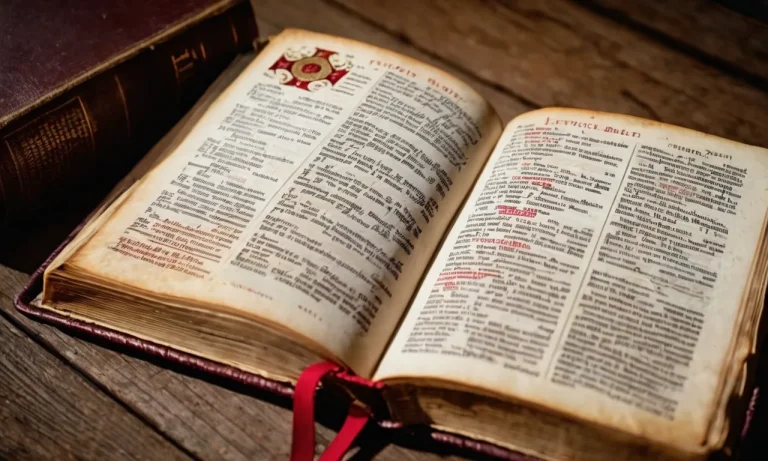What Did Jesus Say About Himself? A Complete Overview
If you were to ask a dozen people who Jesus claimed to be, you may get a variety of answers. Some may say a great moral teacher. Others, a prophet. And still others, the literal Son of God or God himself.
If you’re short on time, here’s a quick answer to your question: Jesus made several bold claims about his divine identity including claiming authority to forgive sins, authority over the Sabbath, the ability to grant eternal life, and unity with God the Father.
In this comprehensive article, we will examine multiple instances throughout the Gospels where Jesus makes audacious statements about his own identity and purpose. We will analyze what Jesus meant, why he spoke this way, and what it tells us about who Jesus understood himself to be.
Jesus Claimed to Forgive Sins
One of the most stunning claims Jesus made about Himself was that He had the authority to forgive sins. The religious leaders of His day were outraged when Jesus told a paralyzed man that his sins were forgiven. They accused Him of blasphemy, claiming that only God could forgive sins (Mark 2:1-12).
However, Jesus demonstrated that He did have the power to forgive sins by healing the paralyzed man immediately after.
On another occasion, Jesus forgave the sins of an adulterous woman and told her to “go and sin no more” (John 8:1-11). The Pharisees condemned Jesus for declaring forgiveness without demanding punishment, but He reminded them that only someone divine could forgive sins.
Forgiving sins was a right reserved only for God (Isaiah 43:25). The fact that Jesus claimed to have this authority—and backed up His claim with supernatural feats—is a clear indication that He saw Himself as divine. As the Son of God, Jesus had the power to forgive and restore people spiritually.
Not only did Jesus forgive sins, but He asserted that the ultimate purpose of His life was to “give his life as a ransom for many” (Mark 10:45). A ransom was the price paid to secure a slave’s freedom.
Therefore, Christ viewed His impending death on the cross as a sacrificial payment to atone for the sins of humanity.
By claiming the divine privilege to forgive sins and declaring that His death would atone for sin, Jesus left no doubt about His view of Himself—He believed He was God in human flesh.
Jesus Claimed Authority Over the Sabbath
One of the most controversial aspects of Jesus’ ministry was his bold claims regarding the Sabbath. The Sabbath was established at creation as a day of rest and rejuvenation, and God commanded His people to keep it holy (Exodus 20:8-11).
However, over time, the Pharisaical Jewish leaders had developed an extensive set of extra-biblical rules and regulations regarding what constituted “work” on the Sabbath. They condemned Jesus for healing on the Sabbath and allowing his disciples to pluck grain when they were hungry.
Jesus directly confronted the faulty thinking of the religious leaders regarding the Sabbath. He proclaimed that “The Sabbath was made for man, not man for the Sabbath” (Mark 2:27). Jesus claimed authority over even God’s appointed day of rest, asserting that he was “Lord even of the Sabbath” (Matthew 12:8).
On several occasions Jesus deliberately healed on the Sabbath as a statement of his divine authority and the true purpose of the Sabbath (Matthew 12:9-14, Mark 3:1-6, Luke 13:10-17).
Jesus also rebuked the Pharisees for their lip service to God while neglecting “the more important matters of the law—justice, mercy and faithfulness” (Matthew 23:23). He accused them of straining out a gnat but swallowing a camel (Matthew 23:24).
The religious leaders majored on minor issues like Sabbath regulations but missed the very heart of God.
Through his controversial stance on the Sabbath, Jesus made some radical assertions. He claimed:
- To have authority over even God’s appointed day of rest
- That human need should take priority over ritualistic rules
- That God desires mercy not empty religion
- That the Sabbath was made for mankind’s benefit, not the reverse
By challenging their assumptions on proper Sabbath observance, Jesus confronted the Pharisees’ entire religious system and worldview. His lordship over the Sabbath underscored his divine identity and authority to interpret God’s law correctly.
Jesus reminded God’s people that the Sabbath was instituted for rest, renewal and doing good—not legalistic rule-keeping.
Jesus Claimed to Grant Eternal Life
One of the most profound claims Jesus made about Himself was that He had the ability to grant eternal life to those who believed in Him. This was an audacious assertion, as only God has the power over spiritual life and death.
Yet Jesus repeatedly stated that those who put their faith in Him would experience everlasting life.
For example, in John 11:25-26 Jesus declares, “I am the resurrection and the life. The one who believes in me will live, even though they die; and whoever lives by believing in me will never die.” He does not say He can lead people to the source of life, but that He Himself is the source of life.
Only God can rightfully claim this power.
Jesus also stated that life comes through belief in Him. In John 6:40 He said, “For my Father’s will is that everyone who looks to the Son and believes in him shall have eternal life, and I will raise them up at the last day.”
This connects to His later statements that no one comes to the Father except through Him (John 14:6). Jesus presents Himself as the sole gateway to eternal life with the Father.
Furthermore, Jesus claimed to have the authority to judge who receives eternal life or damnation. John 5:21-22 states, “For just as the Father raises the dead and gives them life, even so the Son gives life to whom he is pleased to give it.
Moreover, the Father judges no one, but has entrusted all judgment to the Son.” The One who decides who receives spiritual life or death is God alone, yet Jesus says He is the One with this authority.
Perhaps most directly, Jesus calls Himself the source of eternal life in John 11:25-26. “I am the resurrection and the life. The one who believes in me will live, even though they die.” Resurrection and life after death come through Jesus alone. No prophet would dare make such an unequivocal statement.
In claiming the ability to grant eternal life to those who believe in Him, Jesus was clearly claiming attributes that can only rightly be ascribed to God. This was a radical statement if He was merely a prophet, but entirely understandable if He was in fact God in human flesh.
Jesus Claimed Unity with God the Father
In the Gospels, Jesus made several startling statements equating Himself with God the Father. He claimed to share the same divine attributes, carry out the same divine works, and be one in essence and glory with the Father (John 10:30).
These claims challenged the prevailing Jewish view of strict monotheism and were radical and offensive to many.
Jesus Claimed Equality with God
Jesus unambiguously equated Himself with God in two powerful “I am” statements recorded in John’s Gospel:
- “Before Abraham was, I am” (John 8:58). By taking the divine name “I am” given to Moses in Exodus 3:14, Jesus associated Himself with the eternal God who transcends time.
- “I and the Father are one” (John 10:30). Jesus asserted His unity and equality with God the Father in the clearest possible terms.
His opponents understood these claims as blasphemy, seeking to stone Him on that basis (John 8:59, 10:31). Interestingly, Jesus never corrected their accusation of equating Himself with God. He willingly accepted the charge because it was true.
Jesus Claimed Divine Attributes
Jesus claimed attributes that in the Old Testament uniquely belong to God:
- Eternal existence – “Before Abraham was born, I am!” (John 8:58)
- Omniscience – “Lord, you know all things” (John 21:17)
- Omnipotence – “All authority in heaven and on earth has been given to me” (Matthew 28:18)
- Omnipresence – “Surely I am with you always, to the very end of the age” (Matthew 28:20)
By claiming these divine attributes, Jesus equated Himself with the eternal, all-knowing, all-powerful, ever-present God of Scripture.
Jesus Claimed Divine Works
In addition to sharing God’s attributes, Jesus claimed the ability to perform divine works:
- Forgive sins – “The Son of Man has authority on earth to forgive sins” (Mark 2:10)
- Give life – “Just as the Father raises the dead and gives them life, even so the Son gives life to whom he is pleased to give it.” (John 5:21)
- Judge all – “Moreover, the Father judges no one, but has entrusted all judgment to the Son” (John 5:22)
The Jews viewed these as the sole prerogatives of God (Isaiah 43:25; Deuteronomy 32:39; Genesis 18:25). By claiming the authority to perform them, Jesus asserted His divine status and power.
Further Evidence for Jesus’ Divine Claims
In addition to Jesus’ direct words, His divine claims were corroborated by other key evidence:
- His sinless perfection – “Can any of you prove me guilty of sin?” (John 8:46)
- His miracles – “Even though you do not believe me, believe the works” (John 10:38)
- His followers’ worship of Him – “Then those who were in the boat worshiped him” (Matthew 14:33)
- His resurrection from the dead – “Jesus answered them, “Destroy this temple, and I will raise it again in three days” (John 2:19)
Taken together, this corroborating evidence gives powerful credence to Jesus’ claims of divine unity and equality with God the Father.
Jesus Accepted Worship
One of the most astonishing claims Jesus made about Himself was that He deserved to be worshiped. In the Jewish faith, the act of worship was reserved only for God. Yet Jesus openly welcomed worship, even demanding it at times. This was unheard of for someone claiming to be the Messiah.
Let’s take a look at several examples from Scripture where Jesus affirmed His deity through the acceptance of worship.
Jesus Accepts Worship from His Disciples
After Jesus miraculously walked on the water and calmed the storm, His disciples worshiped Him saying “Truly you are the Son of God” (Matthew 14:33). Their act of worship confirmed they understood Jesus was much more than just a teacher or prophet.
By accepting their worship, Jesus was claiming equality with God.
In another instance, Jesus appeared to the disciples after His resurrection. Matthew 28:17 says, “And when they saw him they worshiped him, but some doubted.” Even in His resurrected body, Jesus accepted the worship freely given by His followers.
A Leper Worships Jesus
When a leper begged Jesus to heal him, Jesus did so out of compassion. Afterwards, Matthew 8:2 says the leper worshipped Him. As God in human flesh, Jesus possessed the power to heal disease and forgave sins.
The leper’s act of worship showed his understanding that only God could do such miraculous works.
The Blind Man Worships Jesus
After Jesus healed a blind beggar in John 9, the man declared, “Lord, I believe.” And he worshiped him” (John 9:38). The former blind man understood that his miraculous healing came from God. By worshiping Jesus, the man affirmed his belief that Jesus was God.
A Canaanite Woman Worships Jesus
In Matthew 15:25, a Gentile woman begged Jesus to heal her demon-possessed daughter. Initially, Jesus did not respond but the woman persisted. Jesus honored her faith and healed her daughter. Afterwards, the woman came and worshiped Him.
As a Canaanite, the woman would have been accustomed to bowing before pagan idols andobjects. Now she lay prostrate before Jesus, affirming that He was the one true living God.
The Disciples Worship Jesus After His Resurrection
After witnessing the risen Savior, the 11 disciples responded in worship. Matthew 28:17 records, “And when they saw Him, they worshiped Him; but some doubted.” Even though some still harbored doubts, the disciples knew enough to honor Jesus as Lord through worship.
This scene is a powerful display of Jesus’ deity.
As many temptations as Jesus faced to sin, accepting inappropriate worship was one temptation he refused. Jesus knew He alone was God in flesh and therefore deserved the glory, honor and praise due to God.
The disciples, lepers, and various faithful people who worshiped Jesus had a glimpse into His true divine identity that sets Him apart from all other religious leaders.
Conclusion
In summary, Jesus made several direct and overt statements about his divine identity throughout the Gospels. He claimed to have the authority and ability to forgive sins, supersede sacred Jewish customs and institutions, grant eternal life to followers, share unity and equality with God, and receive worship due solely to the Divine.
These represent radical and unprecedented assertions. Jesus consciously made them to communicate deeper truths about his purpose and identity. Whether one views him as simply a moral teacher, prophet or the literal Son of God depends significantly on how one interprets these statements.








